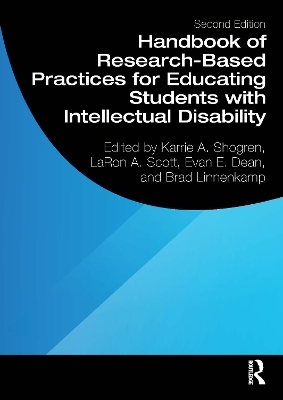
Handbook of Research-Based Practices for Educating Students with Intellectual Disability
Routledge (Verlag)
978-1-032-41337-2 (ISBN)
Driven by the collaboration of accomplished, nationally recognized professionals of varied approaches, lived experience and expertise, and philosophies, the book is updated with new theory and research-based practices that have been shown to be effective through multiple methodologies, to help readers select interventions and supports based on the evidence of their effectiveness. Considering the field of intellectual disability from a transdisciplinary perspective, it integrates a greater focus on advancing equity in educational outcomes for students.
This book is a professional resource and graduate level text for preservice and in-service educators, psychologists, speech/language therapists and other clinicians involved in the education of children, youth, and adults with intellectual disability.
Karrie A. Shogren is Ross and Marianna Beach Distinguished Professor of Special Education, Director of the Kansas University Center on Developmental Disabilities (KUCDD), and Senior Scientist at the Schiefelbusch Life Span Institute, University of Kansas, USA. LaRon A. Scott is Associate Professor of Special Education in the Department of Curriculum, Instruction, & Special Education and Associate Dean for Diversity, Equity and Inclusion at the University of Virginia, USA. Evan E. Dean is Associate Director of the Kansas University Center on Developmental Disabilities and Assistant Research Professor at the Schiefelbusch Life Span Institute, University of Kansas, USA. Brad Linnenkamp is Assistant Researcher at the Kansas University Center on Developmental Disabilities (KUCDD), University of Kansas, USA. The editors would also like to acknowledge the contributions of Michael L. Wehmeyer to the first edition of this book.
Section I: Understanding Intellectual Disability 1. Our Lived Experiences with Language, Ableism, and Supports: Implications for the Education of People with Intellectual and Developmental Disabilities 2. Historical Understandings of Intellectual Disability and the Emergence of Special Education 3. Strengths-Based Approaches to Intellectual Disability 4. Intersectionality of Race/Ethnicity, Gender, Sexual Orientation, and Intellectual Disability Section II: Eligibility, Assessment, and Educational Planning 5. My Experiences with my IEP and Receiving Special Education Services 6. Assessment for Eligibility 7. Assessment for Educational Supports Planning 8. Assessment to Support Learning 9. Developing High Quality IEPs for Students with Intellectual Disability 10. Research and Practice for Transition: Bridging Academics and Transition Goals for Students with Intellectual Disability Section III: Supporting Student Learning in Inclusive Settings 11. Our Lived Experiences with Receiving Supports in Inclusive Education Settings and Preparing for Life After High School 12. Teaching Reading and Literacy to Students with Intellectual Disability 13. Science, Technology, Engineering, and Mathematics (STEM) for Students with Intellectual Disability 14. Positive Behavior Interventions and Supports for Students with Intellectual Disability: Ensuring Culturally Responsive, Trauma-Informed, Person-Centered Supports 15. Building Social Networks 16. Self-Determination 17. College and Career Readiness Access and Support for Youth with Intellectual Disability Section IV: Creating Inclusive Schools and Classrooms 18. My Lived Experience with Inclusion, Belonging, and Collaboration in Schools: Implications for Policy and Practice 19. Supporting Digital Participation of Youth with Intellectual Disability 20. Family Supports and Students with Intellectual and Developmental Disabilities 21. Collaborating to Support a Successful Transition from School into Adult Life 22. Working Conditions and Strategies to Support the Quality of Special Education Teachers Serving Students with Intellectual Disability 23. Creating Rightful Presence in School Communities Section V: Education Across the Lifespan 24. What Makes Me Successful in Adulthood 25. Supporting Young Children through the Early Childhood Years 26. Fostering Equity and Inclusion in Secondary Education for Students with Intellectual Disability: Guidelines for Practice and Research 27. Postsecondary Education for Students with Intellectual Disability 28. Transitioning to Employment: A World of Opportunity for Youth and Young Adults with Intellectual Disability 29. Health and Healthcare Transition 30. Transition Practices to Promote Active Citizenship of Youth with Intellectual and Developmental Disabilities
| Erscheinungsdatum | 21.08.2024 |
|---|---|
| Zusatzinfo | 22 Tables, black and white; 17 Line drawings, black and white; 5 Halftones, black and white; 22 Illustrations, black and white |
| Verlagsort | London |
| Sprache | englisch |
| Maße | 178 x 254 mm |
| Gewicht | 1084 g |
| Themenwelt | Geisteswissenschaften ► Psychologie ► Pädagogische Psychologie |
| Medizin / Pharmazie ► Medizinische Fachgebiete ► Psychiatrie / Psychotherapie | |
| Sozialwissenschaften ► Pädagogik ► Bildungstheorie | |
| Sozialwissenschaften ► Pädagogik ► Erwachsenenbildung | |
| Sozialwissenschaften ► Pädagogik ► Sonder-, Heil- und Förderpädagogik | |
| ISBN-10 | 1-032-41337-9 / 1032413379 |
| ISBN-13 | 978-1-032-41337-2 / 9781032413372 |
| Zustand | Neuware |
| Haben Sie eine Frage zum Produkt? |
aus dem Bereich


